Hello and welcome everyone, to the finale of Welcome to the NHK! We have a lot to talk about this week, some of it bad, most of it good. For those looking for the long and short of it leading into the final review? Good ending, good show, minor philosophical differences. And for those who want more? Well let’s jump right into it.
Visually there was some really good stuff in these two episodes. In fact, I dare say this finale is the best NHK has ever looked, with Tetsuya Takeuchi’s work in particular standing out. The way he, and others, brought these characters to life was just fantastic. I’m not just talking about bombastic over the top scenes like Sato running towards the cliff, though that was good. Rather it was all the smaller character moments, both before and after, that stood out to me. Sato and Misaki embracing in the snow. Misaki’s mother’s hair and clothing fluttering in a strong wind. The shock, grief, anguish and joy on their faces throughout both of the episodes. And all it pays off in spades! This really does feel like the end, and I think that’s important for a finale. Of course it was also all fantastically shot, as usual.
As for the show itself, lets start with my feelings on NHK’s finale as a whole. It was… Complicated. In a lot of ways. I think the emotional core of NHK all works. Sato, Misaki, everyone else, their issues are still very real issues. Problems that people go through and deal with ever day. However the presentation of it all is concerning to me. Take Sato’s soliloquy in episode 23, “Welcome To Misaki!”, for example. He reiterates a lot of what NHK proposed back during Megumi’s arc. That being a Hikikomori is a luxury, a lifestyle that can only exist so long as other people let it. And he isn’t wrong in a sense. Sato couldn’t live that life without his allowance. Megumi’s brother did only leave to survive, just like Sato. However that feels to much like blaming someone’s family for caring rather than addressing the issues at hand.
I don’t want to say that’s what NHK is doing here. I don’t believe it’s laying all of Sato or Misaki or Yamazaki’s problems at the feet of their parents or society at large. NHK still very much acknowledges that Sato did a lot of this to himself, that these are their issues to work through. But like with the suicide cult plotline halfway through the series, I find this community perspective to be very off putting. I understand that Japan is a very communally focused society. However it feels like NHK is saying that we, modern society, are enabling the Hikikomori lifestyle and similarly culpable in some way. And that just rubs me the wrong way. It’s like NHK is simultaneously saying “There is no true fix and its your parents fault you are like this”. Simultaneously shifting the guilt while telling you to suck it up anyways.
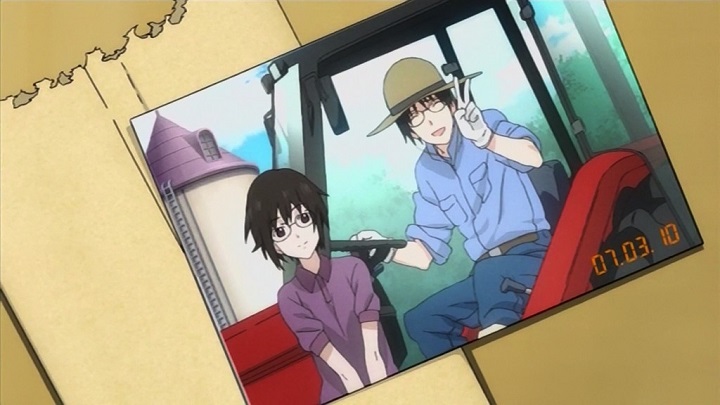
That said, that is also the most uncharitable way to look at it. I do think it’s an interesting perspective, and there is a lot of positive in it as well. Because while NHK posits that your problems never truly go away, it also says that you are strong enough over come them. That even people at their lowest, like Sato or Megumi’s brother who had already given up, are better than they think. It’s hopeful, it’s uplifting, it’s saying that Hikikomori aren’t garbage and shouldn’t be given up on. They just need a bit of a push. Yamazaki, when brought home, realizes there is a simple happiness to be had working as a farmer despite his lost dream. Hitomi finds purpose and companionship in Jougasaki and their child. Sato finds love just outside his doorstep if he would just go out and grab it. In that, I like it.
Most likely my issue’s just stem from the independent way I was raised. While it may not be NHK’s intent, this feeling of passing the blame around doesn’t sit right with me, nor does the idea that you can’t truly overcome your issues. Most of all though, I find Yamazaki’s ending kind of sad. The guy gave up on his dream and NHK is painting it almost like a happy ending. And that feels like the crux of the issue for me. The emotions are there, NHK expertly pulled me in and expressed what it wanted to, I was invested. I just don’t fully agree with their conclusion. But you know what? That’s alright. Because at the very least, I think NHK did a good and clear job at expressing that conclusion. I feel like I had a conversation with this finale, rather than a puzzle or being preached at.
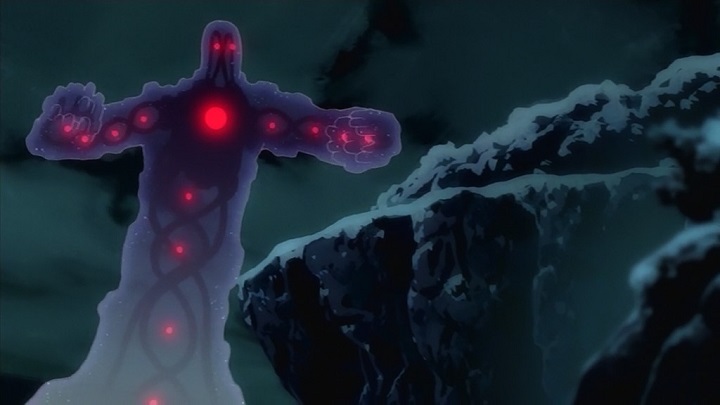
With that exploration of thoughts and feelings out of the way, lets get into the episodes proper! And first up we have the previously mentioned episode 23, “Welcome to Misaki!”. Where last episode set it up, this one kicks off Misaki’s whole thing. Clearly feeling herself and Sato drifting apart after the New Years visit and Hitomi, she makes one final do or die play: A graduation exam/date into a new contract, which based on its language was effectively a marriage contract. What’s interesting though is her plans afterwards. Misaki was clearly planning to kill herself, she says as much about going somewhere far away. So did she just want this as proof someone cared for her before she died? Or was she actually going to hold off had Sato said yes and signed it? I’m honestly not sure, so let me know what you think down below.
As for Sato’s reaction to it? I 100% agree with him. The whole thing feels empty. Lacking. This isn’t a relationship born of love and companionship, at least not anymore. If Sato signs that contract, it becomes one of dependence. Where they are desperately sticking together and supporting each other because they have nowhere else to go. In a way, looking back on the previous conversation of how NHK deals with issues, they would be hiding from the problem. Never acknowledging it or standing up to it. Just hiding away in their little world where Misaki supports and enables his Hikikomori lifestyle while holding onto Sato for dear life. For all that I criticize how NHK views these issues above, this is a much less healthy way to deal with them. So with how much Sato has adjusted, of course he would recognize this and turn it down.
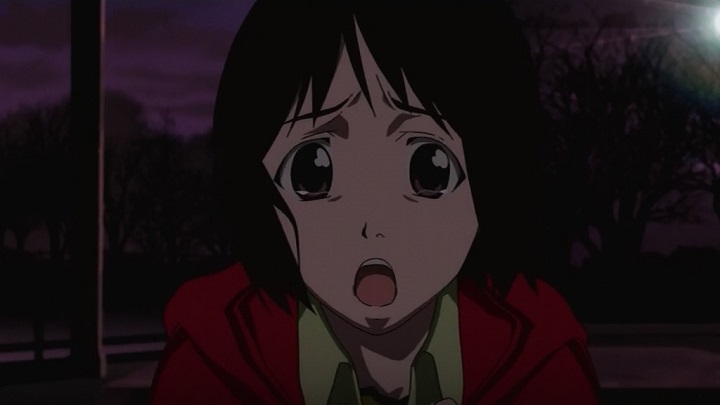
So what are the effects of all of that? Nothing terribly good I’m afraid, at least not for Misaki. Hers is pretty clear cut, she attempts suicide not long after and is rushed to the hospital. But for Sato? Well it brings us back to the discussion of how NHK views these issues, and Hikikomori-ism in general. Just like Megumi’s brother, Sato starts to starve and fade away in his apartment. He has no support, no one to help or take care of him. And so he just… gets up, leaves and finds a job. And while this is good for him, its obviously a positive direction for him to go, I still don’t agree with NHK’s presumption that the only way out of the lifestyle is to be forced out. I still think it doesn’t address the core question of why people do it to begin with.
But I won’t rehash that argument again. Instead lets move on to episode 24, “Welcome to the NHK”. This is it. This is the big confrontation, the finale, the culmination of both Sato and Misaki’s arcs. And you wanna know the funniest thing about it? The thought that popped into my head halfway through the episode? Steins;Gate. For some reason all I could think of as Sato was trying to convince Misaki of these conspiracies, this coping mechanism, was of Okabe, Mayuri, and their Mad Scientist/Hostage game. Now obviously there’s a very big difference between these two things. But at the same time, the spirit of the two feel really close. Sato doesn’t feel like he truly believes in the conspiracy or anything anymore. But he’s giving Misaki someone, something, else to blame than herself. It’s a delusion, but one built to help. A crutch.
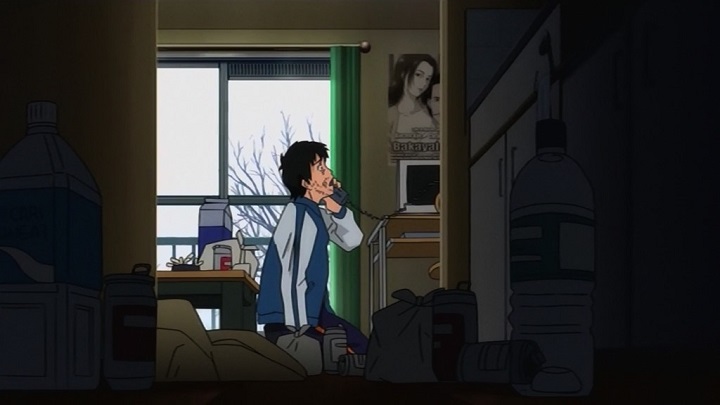
Aside from that humorous anecdote though, I do think the episode was really good. Despite all of my previously mentioned disagreements with NHK’s thematic conclusions, the emotional setup and payoff throughout this episode was excellent. Sato trying to beat Misaki to the cliff, their conversation, him doing his best to help her through it, ending the whole thing on a minor timeskip showing every character living better lives than they had at NHK’s start. As far as emotional connection and communication goes, NHK absolutely nailed it. My only real issue on that front is I was kind of hoping Sato and Misaki wouldn’t become romantically involved. I still don’t think its a healthy relationship, and I was hoping they could move past that hangup and come to support each other as friends. Still, it works well enough. It certainly doesn’t hurt the finale much at all.
But with that I have to cut this one a bit short. Well, this episode at least. Not the post, did you see that opening rant? All in all I think this was a really good ending for NHK. It sparked a discussion rather than demanding I think in only one way, and I like that. And it did it without losing the emotional core of the show, which is usually very difficult. I’m going to have a lot to say about it in my final review in a week or 2. In the meantime though, I have homework for you as well: A poll. A poll to decide what the next series we watch is going to be! That’s right dear readers, once again you get to decide what the next 3 months of my life will be like. Please choose wisely, and I’ll see you next week.

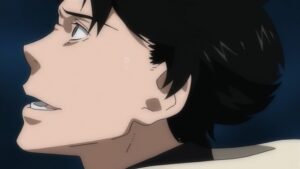
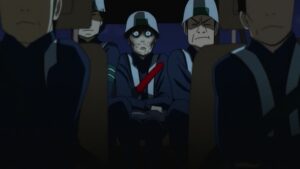
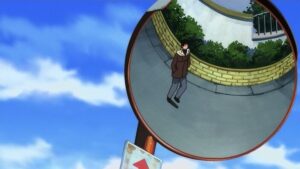
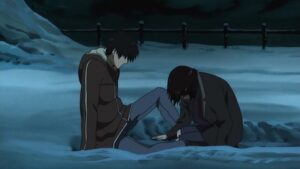
My problem with this show (and I wont deny it belongs to the classics) is that 1 it’s all over the place, 2 characters end up where they started (their journey had no effect on anything, turning senpai, glasses-kun, pyramid scheme girl and her hikikomori bro into exploratory throw-away characters, thematically in line, but pointless) and 3 MC behaves VERY inconsistently, with all that random screaming in class and stuff.
But I heard on MAL that in the source material MC was on drugs (but it was censored), which would explain a lot. If thats true, then 1 the drug arc was butchered, 2 this show really is just series of exploratory arcs rather than MC’s personal journey out of the problem (which is very annoying format to choose for show like this). I didnt investigate/confirm the drug/censorship further, but for now, I choose to believe it and I consider this an adaptation gone wrong and pointless, making this an inherently broken classic, worth for the cultural depictions (puru~puru~puuuuru~rin pururi~n) rather than its message or conclusion.
It’s simply not satisfactory, at all. The final arc didnt feel cathartic, rather a mid-season climax. Ultimately, this show discarded all its characters one by one, as if it couldnt be bothered by properly concluding them, making weird tonal changes. All of these characters just vanish, both in the show and in their world. The character conclusions are always last-minute and just a band-aid. The only reasonable development went to the hikikomori guy. Misaki didnt develop at all, and you could say the entire show could be the first 2 and the last 2 episodes.
As for glasses-kun, I disagree that him abandoning his dream is a cop out. Thats how it works baby. Like him, most people aim too high, because they dont build proper foundations to achieve their goals. These people need to either go back to basics (so they can get back to their goal later on) or abandon the goal altogether. If their bad decisions cause them to become obsessed or live unhealthy lifestyle, the solution IS becoming anchored in reality, like going back to parents and help with the farm. In theory, he can work on himself in the meanitime and not necessarily abandon the dream, but there is no need to depict that, in fact it would be detrimental to the show’s message – the point isn’t to achieve some silly unrealistic dream, but to be well adjusted in society – thats where happiness comes from (no, not from ‘dreams’, lavish lifestyle, ‘success’ and such). The city losers wont ever accept that he will be happier there, but he WILL*. Its simple and effective and there nothing else to say. So I think the character was solved correctly, but the tonal changes are unnaceptable and lack of focus on his transformation is a problem.
Most of the people are exactly like this guy. They never accomplish their dreams. They never had proper foundation (values, educations, skills) or motivation or perseverance and go to city and expect success to come to them from the sky. These people would never go back to their ‘stupid backwards redneck’ parents slaving away on the farm or garden and consider that the ultimate failure, yet, they they are even bigger slaves in the city, morally bankrupt, no values, no reason to live, merely chasing imaginary success hanged in front of them by corporations, media and other instagram losers, profiting from the sucess pyramid, propped by other losers. In the show, the farm is a way out, an anchor, a meaningful way to live.
It’s all so stupid, like the video on youtube about a woman building a house in a forest with her bare hands. Everyone is praising and ‘envying’ her accomplishments and lifestyle, but literally NOBODY would go live in a middle of rainforest with tigers, mosquitos and no iphone. Deep down, everyone knows that the answer to all their problems is simple (just be in touch with nature and self) but noone is doing it, they’ll do it ‘after’ their success. Right.
That’s where most of the depressions nowadays come from, living a lie. The hard part is not doing the right thing, but wanting to do it, because they’ve been conditioned that’s wasting their life, so paradoxically, they waste their life and despair. As for hikikomori, thats a product of the societal weight produced by fake values. The fake values (be it internet clicks, career, beauty, money, whatever) create drive and that creates vacuum for those at the bottom, who do not or can not play along. They are casted as loosers and if they still buy into the fake value system, they think of themselves as such as well. The greatest fear of most people is public humiliation and that is what keeps hikikomori in their caves. These people either need to step up their game or unplug (aka work on farm). Globally, stepping up the game is meaningless, because the game is a pyramid scheme – the more people will play, the greater the force and the greater the difference between the top and bottom will be, creating even more vacuum at the bottom. All of the imaginary values converge at the top creating an insane power vortex sucking in everyone, the most those at the top (narcissistic psychos and whores). Its a black hole with ~LUST~ in the centre, but beyond the event horizon is but an empty world where values go to die. The worst however is how the lust converges everything into itself as the most universal currency, which means everything is part of the system, even those that don’t play. This sucks resources out in an accelerating way. In short – ever increasing number of loosers run the society for ever more superior elite of degenerates.
Hikikomori are basically people with one of the stats in negative and the fake value system and collective society in Japan deny them access to any participation whatsoever. But fake values only produce fake restriction, so if a person generates its own self worth, the issue fixes itself. Well, the society still remains broken, but if the elites in the vortex generated their own self worth as well, literally everything would fix itself. The values still need to be shared across the society, but own self worth should come from inside.
Ultimately, the actual solution to the hikikomori is finding a reason to live, i.e., go out, marry, and have children (and reason to live will come on its own), so the anime actually got it right.
You do know that human veungs are inconsistent and flawed right? What the fuck did you expect a happy ending where the heroes makes all the right choices? That’s not the point of the show dude.
Nobody said anything about good or bad ending.
I don’t think you understood anything I said. TLDR: NHK is an interesting show, but it does not truly reveal the source of the problem it is trying to depict – collapse of societal values.